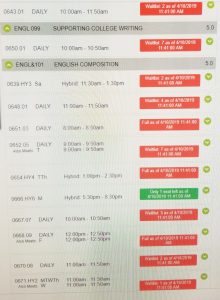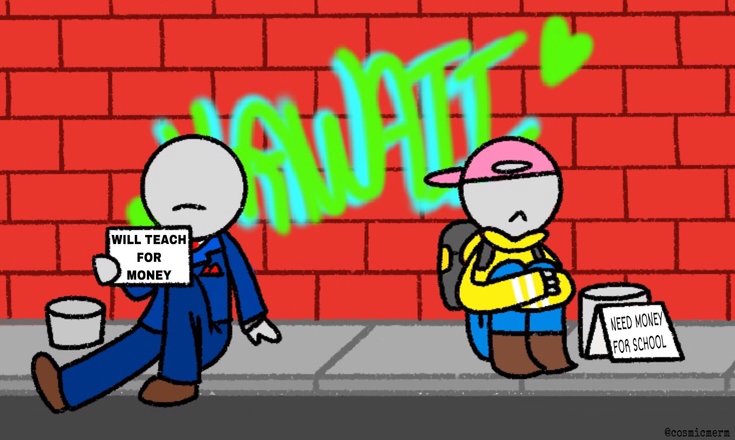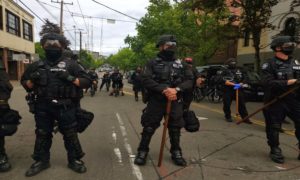Students have been questioning the recent course cancellations for the current spring quarter. Towards the end of March, several classes were cut for the upcoming quarter and the administration had not provided any information to students regarding what’s behind these closures. Faculty members are up in arms regarding the type of courses targeted for cancellation. While enrollment numbers seem to be a factor with core subjects like math and English, a focus on classes dealing with marginalized communities seems to be in the spotlight. Some students and faculty have stated they believe the specific courses selected for cancellation were targeted towards subjects that dealt with marginalized and underserved communities, while some have stated that SCC is moving away from providing adequate courses in the arts, humanities, and social sciences.
“Twenty years ago, SCC was considered by Time Magazine to be one of the most innovative undergrad programs in the country. Much of the innovation is now gone.” – Anthropology Professor, Peter Knutson, Ph.D.
Peter Knutson, Ph.D. and tenured Anthropology Professor here at Seattle Central, discussed the closures in detail after speaking with his colleagues in the SAGE Program. “They told me that the Deans have been ordered to make 3% reductions in expenditures. The Social Science Coordinator was told that the Deans wanted a 90% fill rate which would be 32 students.” Dr. Knutson originally had three Anthropology course offerings for the spring quarter, which include ANTH 270 ‘Food, Culture, and Politics’ that is needed for SAGE emphasis students to complete their course requirements. Another course, ANTH 205 ‘Biological Anthropology’ is a transferrable course that is required for Anthropology majors at the University of Washington and Western Washington University. At the close of the winter quarter, the decision was made to cut ANTH 205, despite an enrollment of 24 students, a higher enrollment number than the ANTH 270 course.

Several students were interviewed about the impact the course cancellations had on their academic plans. All requested to remain anonymous for fear of repercussions for speaking out against Seattle Central’s administrative decision. One student said that while trying to find alternative courses, most core classes were full and waitlists were either long or at capacity and while there was room in online classes, their learning disability prevented them from enrolling in online classes. Another student said they were attempting to discuss winter quarter final grades with their instructor in between classes when the instructor broke down and apologized, stating that their classes for spring quarter were canceled and they were unsure of how they were going to continue to pay rent.
Anthropology students interviewed were up in arms when the Biological Anthropology course was canceled. One UW transfer student hopeful and Anthropology major enrolled in three courses for spring quarter – Biological Anthropology, Sex Roles in Society, and Post Colonial Literature – all of which were canceled. The student attempted to enroll in other SCC courses, but most waitlists were already full. Other available courses were not transferrable to UW or did not apply to their major. The student was forced to find other course options outside of Seattle Central and now has dual enrollment with North Seattle College, causing significant impact to their daily life.
Some canceled courses include Asian American History, Latin American History, Post Colonial Literature, Sex Roles in Society. According to Dr. Knutson, additional courses that were considered for cancellation included American Indian Art, Western Art, Women in the Global Context, and other Sociology and Intercultural Communications courses. “As you can see, many of these courses are minority and gender-focused,” stated Knutson. “As we constrict the diversity of our curriculum, we accelerate the downward spiral. Twenty years ago, SCC was considered by Time Magazine to be one of the most innovative undergrad programs in the country. Much of the innovation is now gone.” Knutson when on to emphasize that “At this point, our curriculum is becoming standardized and introductory. In other words, there is less and less that distinguishes us from any other community college in terms of course offerings. Where we were once a destination college, today we’ve lost that edge. There is less incentive for students to fight horrific Seattle traffic to get a unique experience. Our unique institutional identity as SCC is going away as the District subsumes the individual colleges and pushes top-down mandates upon faculty.”
The Dean of the Arts, Humanities, and Social Sciences Division, Laila Abdalla. Ph.D. was contacted for comment. Dr. Abdalla referred to information from the Office of Vice Chancellor for Academic and Student Success, which reports an unexpected drop in enrollment across all the Seattle Colleges for the current academic year. The enrollment targets set by the district’s administration, which provides budgeting for operations, are important to meet in order to fund the school. Full-time enrollment numbers, or FTEs, were significantly reduced as of winter quarter. According to the Office of the Vice Chancellor for Academic and Student Success, “For the Winter Quarter 2019, the Seattle District generated 9,705 quarterly State Funded FTES by Tenth Day. This is 77% of our target goal of 12,529. North was short by 12%; Central was short by 15%; South was short by 37%, and SVI was short by 71%. The Seattle District has reached 61% of the annual target by the Tenth day of Winter Quarter 2019.”
“We are not at all moving away from important subjects such as those that focus on subjects to do with marginalized and under-served communities.” – AHSS Dean, Laila Abdalla, Ph.D.
Dr. Abdalla went on to say that, “There is a significant fall in the number of students looking to enroll in the Colleges, across the board [..] Historically, the pattern is that Fall has the highest enrollment, and Spring typically does not always have as many students. Spring is the last quarter in the academic year, and to have 39% of our annual target still to accomplish in just one quarter is a very tall order. It is not likely that we’re going to make it this year. So yes, it is true that we have had to cut some courses this year, but mainly due to the fact that the students are not here to take them. I don’t know why.” In regards to course closures focusing on marginalized populations, Dr. Abdalls stated, “This is categorically untrue. We are not at all moving away from important subjects such as those that focus on subjects to do with marginalized and under-served communities. The fact is that most of the courses in the Arts, Humanities, and Social Sciences treat these subjects and serve these populations in one way or another. More essentially, we are also making deliberate decisions to protect and run some courses that do so more specifically, even if they have low enrollments.”
Dr. Abdalla was unwilling to discuss the reasons behind the decision to cut particular courses as they “may identify instructors or certain disciplines,” but felt that the AHSS department was “doing an excellent job of managing this delicate balance.” These decisions are all part of a districtwide Strategic Enrollment Management system. Unfortunately, as Dr. Abdalla pointed out, the college cannot always account for unexpected decreases in student enrollment. Dr. Abdalla went on to state that “If we continued to run Seattle Central College at 15% below its target enrollment, or if we don’t battle to prevent any more slippage, we will only create the conditions for more severe or damaging cuts.”
The student body population and the faculty and staff at Seattle Central College are all suffering. Several instructors are speaking out in the classrooms and students are conveying their worry for the future of this educational institution. On April 16th, a district-wide walkout will occur beginning at 8:30 am to support the need for Washington state to fulfill the funding mandate for our community and technical colleges. For more information on ROC or We Walk, visit their Facebook page.






Comments are closed.